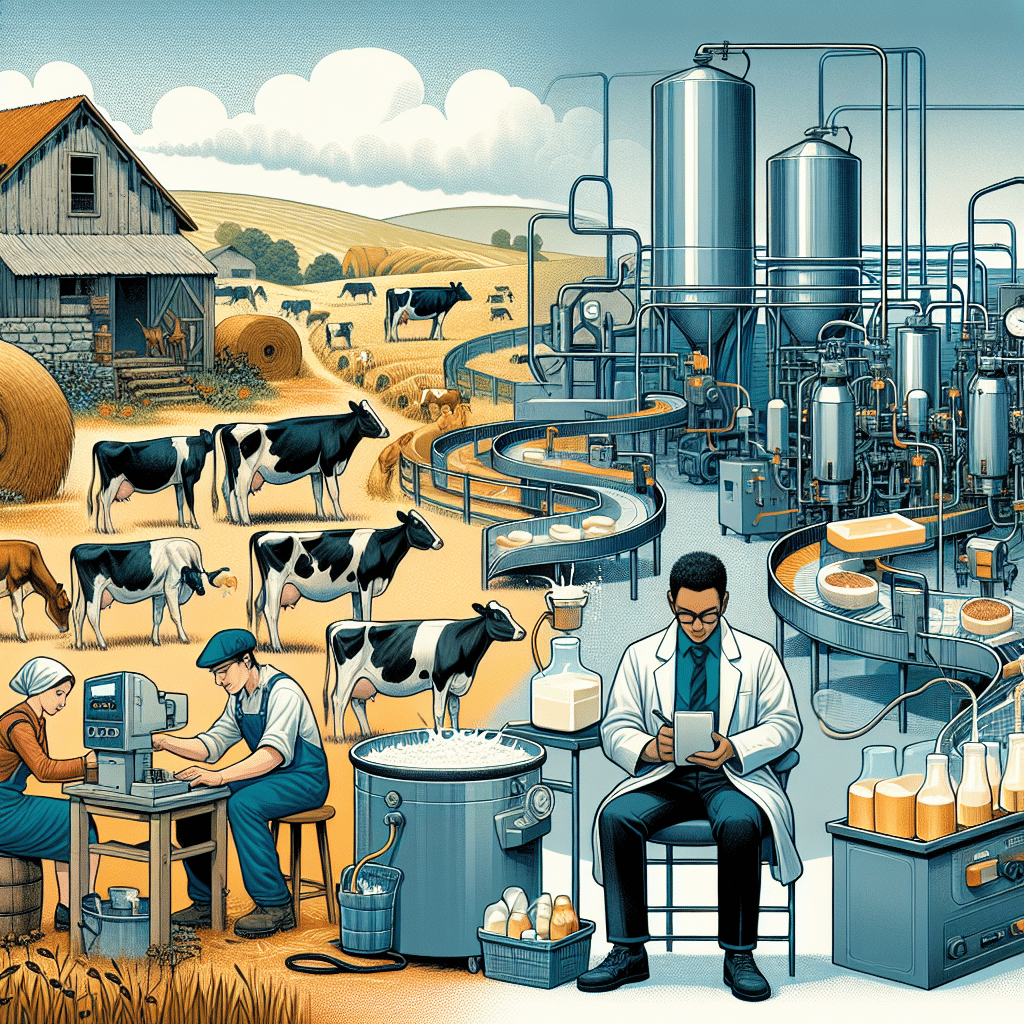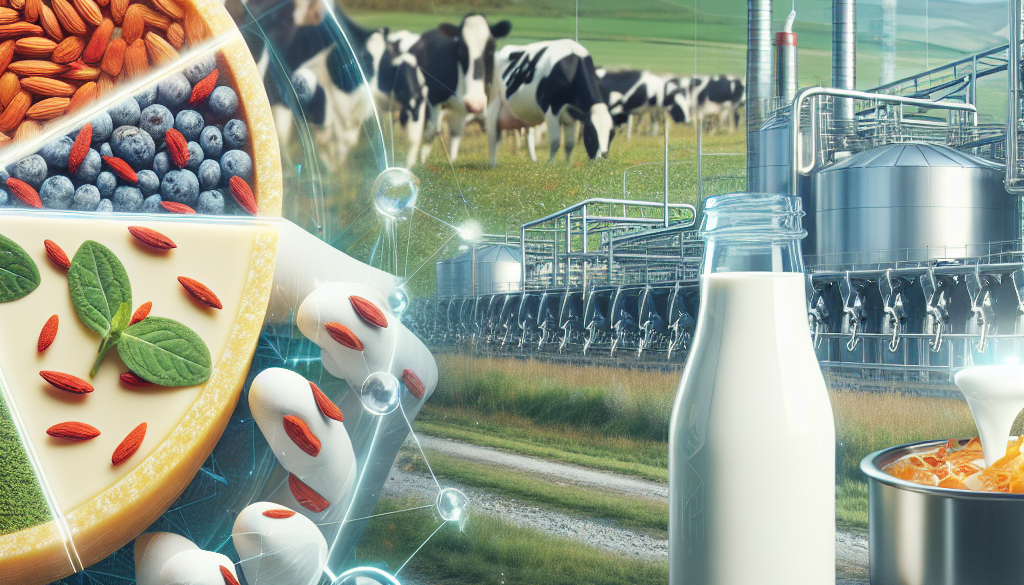Dairy Continues to Innovate as New Options Arrive
-
Table of Contents
Dairy Innovation Flourishes with Emerging Alternative Options

The dairy industry has long been a staple in global agriculture, providing a wide array of products essential to everyday diets. However, as consumer preferences evolve and environmental concerns rise, the industry is undergoing a significant transformation. Innovations in dairy and the emergence of new, non-dairy alternatives are reshaping the market. This article delves into the latest trends and technological advancements that are driving change in the dairy sector.
The Evolution of Traditional Dairy
Despite facing competition from plant-based alternatives, traditional dairy is not standing still. Dairy producers are leveraging technology and new scientific insights to enhance their products. Here are some of the key innovations:
- Enhanced Nutritional Profiles: Dairy products are being fortified with additional nutrients, such as omega-3 fatty acids, to provide extra health benefits.
- Lactose-Free Options: Recognizing lactose intolerance in a significant portion of the population, dairy companies have expanded their offerings to include lactose-free milk and dairy products.
- Probiotic Dairy: The rise of gut health awareness has led to an increase in probiotic-enriched dairy products, such as yogurts and kefirs, which support digestive health.
- Sustainable Practices: Dairy farms are adopting more sustainable practices, including methane reduction techniques and improved waste management systems.
These innovations are helping traditional dairy maintain its relevance in a changing market, but the industry is also facing a new wave of competition from non-dairy alternatives.
The Surge of Dairy Alternatives
The demand for dairy alternatives is skyrocketing, driven by a variety of factors including dietary restrictions, environmental concerns, and animal welfare considerations. Here’s a look at some of the new options arriving on the scene:
- Plant-Based Milks: Almond, soy, oat, and coconut milks are just a few examples of the plant-based milks that have gained popularity. Each offers a unique nutritional profile and flavor.
- Nutritional Enhancements: Many dairy alternatives are now fortified with calcium, vitamin D, and other nutrients to more closely mimic the nutritional benefits of cow’s milk.
- Technological Innovations: Advances in food science have led to improvements in taste, texture, and shelf life of dairy-free products.
- Environmental Impact: Plant-based dairy alternatives often have a lower environmental footprint, appealing to eco-conscious consumers.
Statistics show that the global dairy alternatives market size was valued at USD 22.6 billion in 2020 and is expected to grow at a compound annual growth rate (CAGR) of 12.5% from 2021 to 2028. This growth is indicative of the significant shift in consumer preferences and the potential for continued innovation in the sector.
Emerging Trends in Dairy and Dairy Alternatives
As the dairy industry continues to evolve, several emerging trends are shaping its future:
- Cell-Based Dairy: Startups are exploring lab-grown dairy proteins that could create milk and cheese without the need for cows, potentially revolutionizing the industry.
- Functional Beverages: Both dairy and non-dairy beverages are being developed with added functional benefits, such as energy-boosting ingredients or stress-relieving adaptogens.
- Flavor Innovations: Unconventional flavors and cross-category fusions are becoming more prevalent in dairy products, catering to adventurous consumers.
- Transparency and Traceability: Consumers are increasingly interested in the origin of their food, leading to greater transparency in sourcing and production processes.
These trends highlight the industry’s commitment to innovation and its ability to adapt to changing consumer demands.
Challenges and Opportunities
While innovation is thriving, both traditional dairy and dairy alternatives face challenges. For dairy producers, there is the need to balance innovation with maintaining the integrity of classic products. Dairy alternatives must continue to improve their environmental sustainability and nutritional profiles to fully compete with dairy.
However, these challenges also present opportunities. There is a growing market for products that can successfully combine the appeal of traditional dairy with the benefits of alternatives. Companies that can navigate these complexities will likely emerge as leaders in the evolving dairy landscape.
Conclusion
The dairy industry is at a crossroads, with traditional dairy innovating to stay relevant and a plethora of new, non-dairy options arriving to meet diverse consumer needs. The sector’s future will be shaped by its ability to continue innovating, whether through enhancing the nutritional value of traditional dairy, reducing its environmental impact, or improving the taste and texture of dairy alternatives. With a focus on sustainability, health, and flavor, the dairy industry is poised for continued growth and transformation.
ETprotein’s Role in Dairy Innovation
As the dairy and dairy alternatives sectors evolve, protein remains a key nutritional component. ETprotein is at the forefront of providing high-quality protein products that can enhance both traditional dairy and dairy alternatives. Their organic bulk vegan proteins and L-(+)-Ergothioneine are ideal for companies looking to innovate and improve their offerings.
ETprotein’s products are characterized by a neutral taste, non-GMO, allergen-free attributes, and high purity levels, making them suitable for a wide range of applications. Whether you’re developing new dairy products or plant-based alternatives, ETprotein’s protein solutions can help you meet consumer demands for health, sustainability, and taste.
About ETprotein:
ETprotein, a reputable protein and L-(+)-Ergothioneine (EGT) Chinese factory manufacturer and supplier, is renowned for producing, stocking, exporting, and delivering the highest quality organic bulk vegan proteins and L-(+)-Ergothioneine. They include Organic rice protein, clear rice protein, pea protein, clear pea protein, watermelon seed protein, pumpkin seed protein, sunflower seed protein, mung bean protein, peanut protein, and L-(+)-Ergothioneine EGT Pharmaceutical grade, L-(+)-Ergothioneine EGT food grade, L-(+)-Ergothioneine EGT cosmetic grade, L-(+)-Ergothioneine EGT reference grade and L-(+)-Ergothioneine EGT standard. Their offerings, characterized by a neutral taste, non-GMO, allergen-free attributes, with L-(+)-Ergothioneine purity over 98%, 99%, cater to a diverse range of industries. They serve nutraceutical, pharmaceutical, cosmeceutical, veterinary, as well as food and beverage finished product distributors, traders, and manufacturers across Europe, USA, Canada, Australia, Thailand, Japan, Korea, Brazil, and Chile, among others.
ETprotein specialization includes exporting and delivering tailor-made protein powder and finished nutritional supplements. Their extensive product range covers sectors like Food and Beverage, Sports Nutrition, Weight Management, Dietary Supplements, Health and Wellness Products, and Infant Formula, ensuring comprehensive solutions to meet all your protein needs.
As a trusted company by leading global food and beverage brands and Fortune 500 companies, ETprotein reinforces China’s reputation in the global arena. For more information or to sample their products, please contact them and email sales(at)ETprotein.com today.












